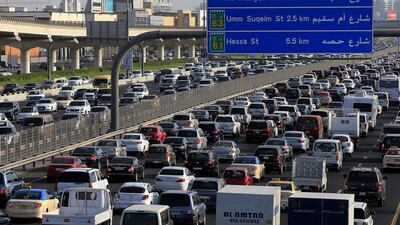DUBAI // Traffic cameras that can detect and fine motorists for tailgating have not yet been activated, said Dubai Police.
The cameras to produce visual evidence for offences, which are part of the vitronic radars on Dubai’s roads, were supposed to go in effect on July 1 of last year.
However, Maj Gen Mohammed Al Zafeen, director of the Federal Traffic Council, said there were logistical obstacles.
“It is hard for the motorist to estimate the exact distance of 10-20 metres, depending on what the radar is set on,” he said, adding: “There may be other problems, such a motorists leaving too much distance between vehicles because they’re scared and congestion.”
He said they may soon be activated to catch those who are “aggressively” tailgating and not leaving at least one metre distance.
Maj Al Zafeen spoke following the White Points ceremony, during which two motorists were awarded a new car as reward for a safe year behind the wheel.
Fatma Darwish and Khawla Al Marzouqi, both from the UAE, were the top two names drawn from more than 1,800 people who did not commit a single traffic offence in 2015. More than 12,000 people between the ages of 18 and 21 were awarded White Points this year, but only the randomly selected 1,800 will be awarded gifts from sponsors.
The two car winners were picked out by Sheikh Mansour bin Mohammed, son of the Sheikh Mohammed bin Rashid, ruler of Dubai, as part of the annual White Points campaign.
To qualify, drivers must not commit offences such as speeding, passing under Salik gates without credit or being issued traffic tickets in Dubai or the other emirates.
Maj Gen Al Zafeen said awarding motorists who are safe behind the wheel can be effective in cutting the number of traffic accidents.
He reiterated that detaining reckless drivers for 24 hours will contribute to reaching Dubai's goal for zero fatalities by 2020.
“I’ve said this before, and I’ll say it again. When you take someone’s freedom for even just 24 hours, it will have an effect on them, and they are less likely to commit the same offence,” he said, adding that he is against the concept of giving discounts on fines.
“To give discounts is basically an invitation for more traffic incidents and for an increase of fatalities.”
newsdesk@thenational.ae

